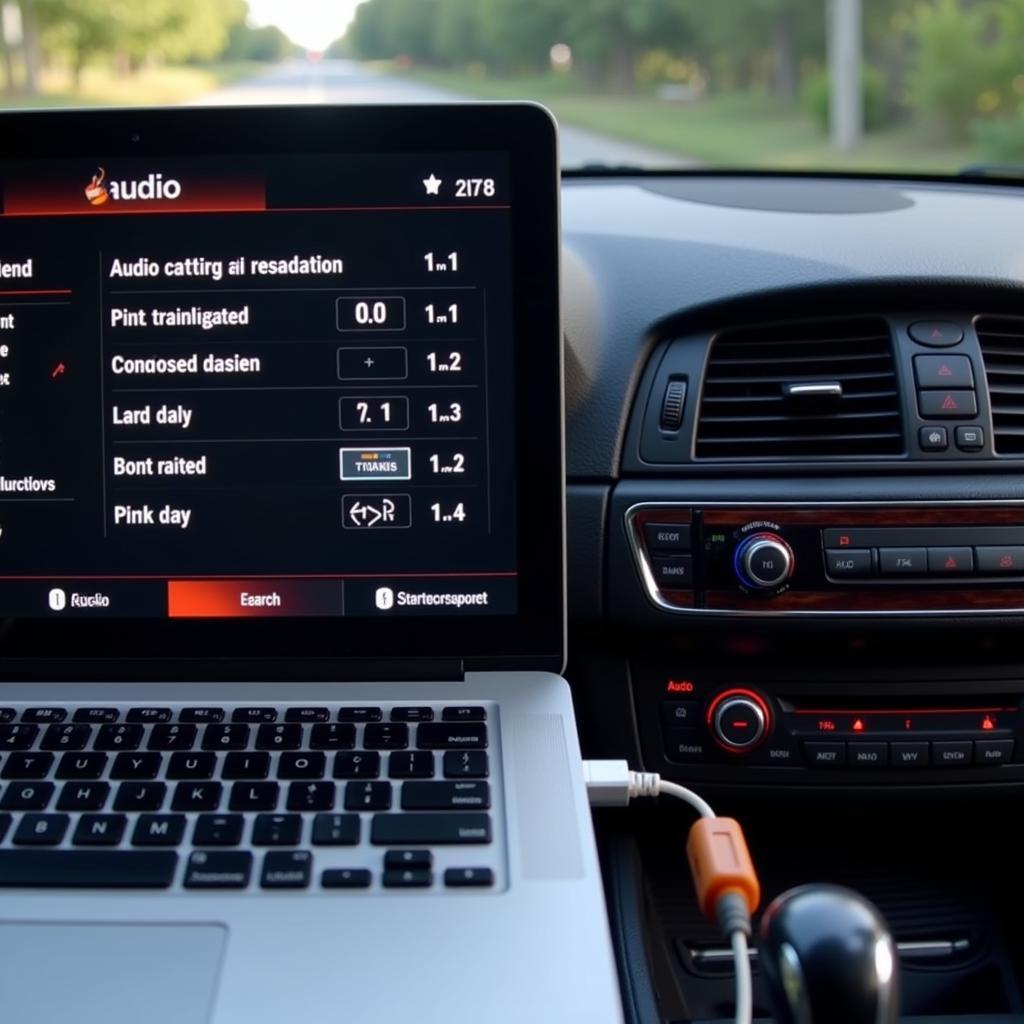The roar of a BMW V8 engine is a thing of beauty, a symphony of power and performance that resonates with car enthusiasts worldwide. Whether you’re a seasoned BMW owner or a curious driver considering joining the family, understanding the nuances of the iconic “BMW V8 exhaust sound” can enhance your appreciation for these remarkable machines. This comprehensive guide delves into the world of BMW V8 exhaust notes, exploring their origins, variations, and even how to achieve that perfect growl.
The Allure of the V8 Roar: Why We Love It
The distinctive rumble of a V8 engine, especially in a BMW, isn’t just about noise; it’s an auditory expression of engineering excellence and raw power. It’s a sound that turns heads, sparks conversations, and leaves a lasting impression.
A Legacy of Power and Performance
BMW has a rich history of crafting high-performance vehicles, and the V8 engine has been a cornerstone of this legacy. From the racetrack to the open road, BMW V8s have consistently delivered exhilarating performance, and their exhaust notes are a testament to this heritage.
The Science of Sound: What Makes a V8 Unique
The unique sound of a V8 engine stems from its firing order and exhaust system design. The arrangement of the eight cylinders, coupled with the carefully tuned exhaust manifolds and mufflers, creates a complex harmonic resonance that produces the signature V8 rumble.
Exploring the Spectrum of BMW V8 Exhaust Sounds
Not all BMW V8s sound alike. The specific exhaust note can vary significantly depending on the model, engine, and even the year of manufacture.
Model-Specific Sound Profiles
Each BMW model is engineered with a distinct character, and the exhaust note plays a crucial role in defining this personality. For instance, a BMW M5, renowned for its aggressive performance, boasts a throatier, more menacing exhaust note compared to the more refined sound of a 7 Series, which prioritizes luxury and comfort.
The Influence of Exhaust Systems
The exhaust system is the instrument through which the V8’s symphony is played. Different exhaust setups, from the factory-installed systems to aftermarket modifications, can dramatically alter the sound.
Stock Exhaust Systems: A Symphony of Balance
BMW’s stock exhaust systems are meticulously engineered to provide a balance of performance, sound quality, and noise regulations. They offer a refined, sporty tone that complements the car’s overall character without being overly intrusive.
Aftermarket Exhaust Systems: Unleashing the Roar
For those seeking to amplify their BMW’s V8 soundtrack, the aftermarket offers a wide array of exhaust components. Performance exhaust systems, cat-back systems, and muffler deletes can all significantly alter the volume, tone, and aggression of the exhaust note.
Fine-Tuning Your BMW V8 Exhaust Sound
If you’re looking to personalize your BMW’s sound, several options are available to tailor the exhaust note to your liking.
1. Exhaust System Upgrades
Upgrading to a performance-oriented exhaust system is one of the most effective ways to enhance your BMW’s V8 sound. These systems are often designed to reduce back pressure, improve airflow, and amplify the engine’s natural growl.
2. Muffler Modifications
The muffler plays a significant role in shaping the exhaust sound. Replacing the stock muffler with a performance muffler or opting for a muffler delete can drastically alter the volume and tone.
3. Exhaust Tips: The Finishing Touch
While exhaust tips primarily affect the aesthetics of your exhaust system, they can also have a subtle impact on the sound. Larger diameter tips can sometimes produce a deeper, more resonant tone.
“Remember,” advises John Miller, a veteran automotive engineer with over two decades of experience, “modifying your exhaust system can affect your car’s emissions and warranty. It’s essential to consult with a qualified mechanic or BMW specialist to ensure any modifications comply with local regulations and do not compromise your vehicle’s performance or reliability.”
Troubleshooting Exhaust Issues: When the Symphony Goes Out of Tune
While a healthy BMW V8 engine produces a harmonious sound, exhaust leaks or other problems can disrupt this symphony.
Common Exhaust Issues and Solutions
Unusual noises such as rattling, hissing, or popping sounds can indicate an exhaust leak, a damaged muffler, or other problems. It’s crucial to address these issues promptly to prevent further damage and maintain optimal performance.
Maintaining Your BMW’s V8 Symphony
Regular maintenance is key to keeping your BMW’s V8 engine performing at its best and ensuring its exhaust note remains a thing of beauty.
The Importance of Regular Service
Following BMW’s recommended service intervals, including oil changes, spark plug replacements, and exhaust system inspections, can help prevent premature wear and tear, ensuring your V8 continues to roar for years to come.
Conclusion: The Enduring Appeal of the BMW V8 Exhaust Sound
The captivating sound of a BMW V8 engine is more than just a byproduct of combustion; it’s an integral part of the driving experience, evoking emotions and reflecting engineering prowess. By understanding the nuances of this symphony, you can enhance your appreciation for these remarkable machines and personalize your BMW’s soundtrack to match your driving style and personality.
For expert advice on enhancing or troubleshooting your BMW’s exhaust system, contact the specialists at Cardiagtech. Our team of certified technicians is dedicated to helping you achieve the perfect sound and performance for your BMW.
Contact us today at +1 (641) 206-8880 or email CARDIAGTECH[email protected]. Our workshop is located at 276 Reock St, City of Orange, NJ 07050, United States.

